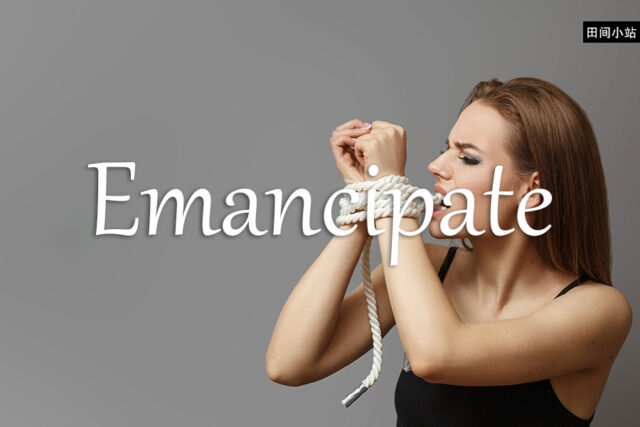本文经授权转载自微信公众号:田间小站

TOEFL SAT TEM8 GRE
外刊例句
- The Communist Party came to power promising to emancipate women from feudalism.
共产党上台时承诺将妇女从封建制度中解放出来。
——《经济学人》 - “I'm emancipated now!” an ebullient Ms. Pelosi said in a recent interview with The Los Angeles Times.
“我现在解放了!” 佩洛西最近在接受《洛杉矶时报》采访时兴高采烈地说道。
——《纽约时报》
基本释义
[verb] set free, especially from legal, social, or political restrictions
[动词] 解放,尤指摆脱法律、社会或政治的限制
深入解读
Emancipate 是一个与常见单词 participate 和 anticipate 有着相同结尾的单词,三者可以一并联想记忆。
从词源上来看, emancipate 则与小站(微信公众号:田间小站)推送过的 manipulate 同词根 man, manu (手),两者都可以向上追溯至拉丁语 manus (手)。
话说在古罗马时期,罗马人在买卖奴隶时,要举行一定的仪式,特别是将奴隶买来后,新主人须将自己的手放在奴隶身上,表示对该奴隶的所有权。这一过程在拉丁语中称为 mancipare (交付、转让、出售),该词由 manus (手)+ capere (拿;捉住)构成。
而将奴隶释放时,奴隶主则将手从奴隶身上挪开,表示放弃对奴隶的所有权。这一过程在拉丁语中称为 emancipare ,该词由前缀 ex- (出、外、由……中弄出)+ mancipare (交付、转让、出售)构成。
Emancipare 最早于1613年进入英语,形成了单词 emancipate ,相应表示“解放、使不受束缚、使不受约束”,常用搭配 emancipate sb from sth ,尤指使奴隶、妇女、思想等摆脱法律、社会或政治的限制,从任何处于控制或支配地位的事物中解放出来,通常也意味着可以自由决定所要采取的路线或所要遵循的原则,比如:
- 这部新机器将把我们从劳累的工作中解放出来。
This new machine will emancipate us from the toil. - 一位思想解放的年轻女士激励他们战斗到流尽最后一滴血。
An emancipated young woman exhorted them to fight to the last drop of their blood.
值得注意的是,古罗马是父系社会,妻子、儿女和奴隶一样都属于男人的私有财产。因此 emancipate 还可以用来表示“使(妻子、孩子)从男性家长的控制下解放出来而获得自主权利”,也就是罗马家庭中的一家之主放弃对子女的父权或对妻子的夫权,给予他们自由。
权威用例
70年前,在中国共产党的领导下,中国人民实现了翻身解放和当家作主。
Seventy years ago, under the leadership of the Communist Party of China (CPC) the people of China were emancipated and became masters of their country.
出自《为人民谋幸福:新中国人权事业发展70年》白皮书(双语全文)。
同近义词
- discharge: release from the custody or restraint of the law
- liberate: set (someone) free from imprisonment, slavery, or oppression
- release: allow or enable to escape from confinement; set free
